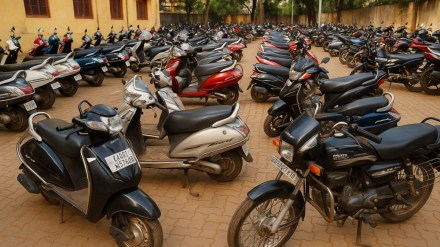The early onset of the monsoon rains in different parts of the country coupled with several steps taken by the RBI to reduce interest rates on loans over the past few months has considerably brightened the prospects of the well-established two-wheeler companies like Bajaj Auto, Hero Motocorp and TVS Motor Company.
And that’s because nearly half of two-wheelers sales in the country happen in rural and semi-rural areas, as per various estimates. And given that agriculture and related sectors are expected to do better this year with prospects of a good rainfall season, this could get a further boost.
Two-wheeler companies are also wooing customers aggressively with several product launches over the past few months. The benefits will be fully visibly over the next few quarters. For instance, Bajaj Auto has a new variant of the popular Pulsar NS125 with anti-braking system (ABS) while TVS Motor Company had earlier launched the latest avatar of the modern retro – the all-new TVS Ronin 2025 edition.
The improved operating environment for well-established two-wheeler players has not gone unnoticed by investors on Dalal Street – Bajaj Auto share price has gained nearly 8.8 % over the past one month while Hero Motocorp has gained nearly 10.5 % during this period. Meanwhile, the broader Sensex has gained barely 1.4 % over the past one month.
Meanwhile, in April 2025, Bajaj Auto’s total sales, two-wheelers and commercial vehicles (primarily three-wheelers) fell 6 % y-o-y to 365,810. And for Hero Motocorp, it dispatched 305,406 motorcycles and scooters in April 2025 vis-à-vis 533, 585 a year earlier, and that was attributed to a temporary production halt from April 17–19 at its Dharuhera, Gurugram, Haridwar, and Neemrana facilities to facilitate supply chain alignment and conduct scheduled maintenance.
Performance in the March 2025 quarter
Hero Motocorp reported a 4.4 % y-o-y increase in its standalone revenue from operations to Rs 9,938.65 crore in the fourth quarter of FY 25 while its profit after tax grew 6.3 % y-o-y to Rs 1080.9 crore in the quarter under review. The New Delhi-based company sold 13.81 lakh motorcycles and scooters in the March 2025 quarter vis-à-vis 13.92 lakh motorcycles and scooters sold a year earlier.
And as for TVS Motor Company, its standalone revenue from operations grew 16.9 % y-o-y to Rs 9,550 crore in the March 2025 quarter while its net profit grew 75.7 % y-o-y to Rs 852 crore in the quarter under review. Sales of two-wheeler and three-wheeler grew by 14 % y-o-y to 12.16 lakh in the March 2025 quarter.
Bajaj Auto will declare its quarterly results on Thursday, 29 May.
Investors on Dalal Street
The Bajaj Auto stock hit a 52-week low of Rs 7,088 on 7 April 2025 and it was trading at Rs 8,826 in mid-afternoon Wednesday trade. Similarly, Hero Motocorp hit a 52-week low of Rs 3,322 on 7 April 2025 and it was trading at Rs 4,337 in mid-afternoon Wednesday trading.
Bajaj Auto trades at a P/E of nearly 27 times estimated standalone FY26 earnings while it is 17 times for Hero Motocorp’s estimated standalone FY 26 earnings.
TVS Motor Company trades at Rs 2,792 in mid-afternoon Wednesday trade and not too far from its 52-week high of Rs 2,958 that was reached on 27 September 2024. The stock trades at more than 40 times estimated standalone FY26 earnings.
Two-wheeler stocks appear quite expensive in the short-term. Perhaps it may be wise to wait for a correction before making any investment on a long-term basis.
Disclaimer
Amriteshwar Mathur is a financial journalist with over 20 years of experience.
Disclosure: The writer and his dependents have no holding in the stocks discussed in this article.
The website managers, its employee(s), and contributors/writers/authors of articles have or may have an outstanding buy or sell position or holding in the securities, options on securities or other related investments of issuers and/or companies discussed therein. The content of the articles and the interpretation of data are solely the personal views of the contributors/ writers/authors. Investors must make their own investment decisions based on their specific objectives, resources and only after consulting such independent advisors as may be necessary.
